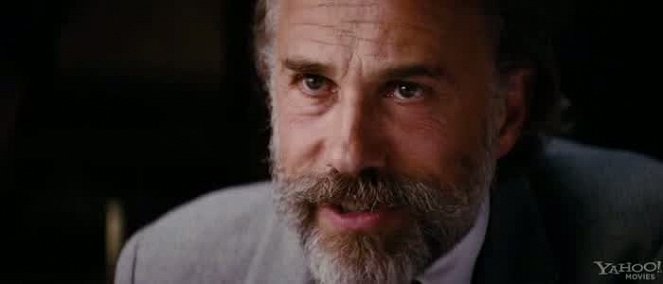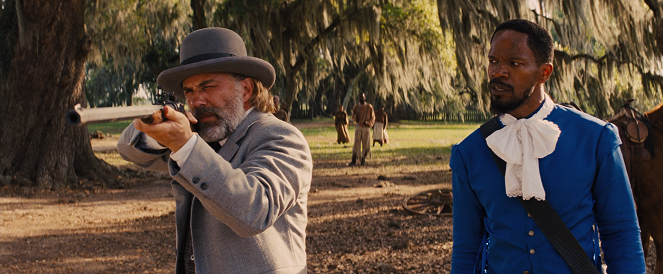Reżyseria:
Quentin TarantinoScenariusz:
Quentin TarantinoZdjęcia:
Robert RichardsonObsada:
Jamie Foxx, Christoph Waltz, Leonardo DiCaprio, Kerry Washington, Samuel L. Jackson, Walton Goggins, Dennis Christopher, James Remar, David Steen (więcej)VOD (3)
Opisy(1)
Jamie Foxx wciela się w postać niewolnika Django, który razem z łowcą nagród Dr. Kingiem Schultzem (Christoph Waltz), w zamian za wyzwolenie, przemierza amerykańskie południe w poszukiwaniu wszelkiego autoramentu rzezimieszków, złoczyńców i kryminalistów. Jednak najważniejszym celem Django, którego umiejętności tropiciela są coraz doskonalsze, jest odnalezienie żony (Kerry Washington), utraconej dawno temu wskutek handlu niewolnikami. Gdy obaj łowcy trafiają wreszcie do Calvina Candie (Leonardo DiCaprio), brutalnego właściciela niesławnej posiadłości „Candyland”, wzbudzają podejrzenia Stephena (Samuel L. Jackson), zaufanego niewolnika Candiego. Ich plany zostają przejrzane, a sami stają się celem ataku niebezpiecznej organizacji. (Imperial Cinepix)
(więcej)Materiały wideo (42)
Recenzje (17)
I was afraid, I don’t like westerns, but I like Tarantino. Fortunately for me, Django Unchained is not even close to a thoroughbred western. It’s just a fun Tarantino movie in the Wild We… South mixed with blaxploitation. After 1200 comments in Filmbooster, it’s hard to come up with something original or interesting to say about Django, so what follows is a couple of personal incoherent rants and observations… The scene with the predecessor of the Ku-Klux-Klan is very funny. The carriage wandering around the American wilderness with a giant model of a tooth on the roof is incredibly cool. Hans Landa can be a nice guy. I wouldn’t like to run into DiCaprio with a hammer. Samuel. L. Jackson is a badass. I liked Inglorious Basterds better :)
()
I didn’t decide to watch this movie for the sole purpose of criticizing Tarantino again. I honestly liked Inglorious Basterds a lot and so I was curious to see what this one would bring. In any case, I knew that style-wise, it was going to be a classic Tarantino that – for a change – uses the best that western’s got to offer. The result was an absolutely unsurprising classic. Tarantino filmed it the best he could. He filmed a piece that respects westerns to the highest degree possible but makes fun of them all at the same time. It respects them with scenes that are a precise copy of some of the best western movie scenes, but it also makes fun of them, for examplewith the fact that the local cowboy is a German and he doesn’t get whiskey in the local saloon; he gets a beer instead. I’ve never seen beer in a western movie before. Also, the Ku Klux Klan scene isn’t one I’m likely to ever forget. And the cherry on top was Jamie Foxx who is an equal of every white man in the movie while the white man simply can’t ever accept that. A classic. Everything comes together to create a great movie, a typical Tarantino piece that isn’t exactly my cup of tea, but that will probablynever change with Tarantino. In any case, I’m glad that I’ve seen the movie and life goes on…
()
Not much of an homage to spaghetti westerns, despite Franco Nero's cameo, rather, some kind of (commendable) anti-racist prod that doesn't even make much sense at the end. The experience resembles a sine wave, as long as Waltz is on screen with his enthusiasm, it's a treat that honours even Western rules. But from the moment we meet DiCaprio, the film goes downhill in quality, where the genre's name would best fit the phrase "typical Tarantino crap" and where the "warrant in your pocket" moment (what a coincidence!) is such a cheap, illogical screenwriting crutch that only a naive viewer can buy it. I could expect anything from Tarantino, but not a cliché like this. And the violence, with hectolitres of squirting ketchup, is so over-stylized (especially in the final carnage) that I'm actually tired of it. PS: The scene with the Ku-Klux-Klan will make anyone laugh, myself included.
()
SPOILERS AHEAD. My second viewing of Django Unchained clarified some seeming structural faults (the triple ending, the ineffectiveness of the romantic storyline), but it still seemed to me that the film has fundamental problems with pacing and cohesion: the continuously changing tone is quite gratuitous, some shots and scenes stick out of the film (the double cameo by Zoe Bell as a woman watching the approaching Django and Schultz from a window and as a gang member). It doesn’t matter that the characters do a lot of talking about things for which a single shot would have sufficed – Tarantino has always been stronger at interior dialogue than narrative images, so we can understand the landscape here as serving a purely decorative purpose. What’s problematic, however, is that some of the dialogue-heavy scenes don’t push the narrative along, nor do they offer any other value added such as slowly built-up tension (which was a major component of Inglourious Basterds). The strangely edited KKK digression after the Brittle brothers are captured (the inserted flashback seems somewhat confusing at first) is nothing more than filler. One storyline concludes, but the next (Hildi) hasn’t yet been opened. The narrative stands still for several minutes. Schultz’s subsequent familiarisation of Django with the rules of the market mechanism initiates the transformation of the slave into a master, which culminates with a radical change of wardrobe. Together with the education in capitalism, however, there is the rather unnecessary (in terms of the narrative, not the viewing experience) training of Django to be the fastest gunslinger in the American south. Despite that, the multi-layered transformation of the protagonist ranks among the best instances of character development in Tarantino’s entire filmography. From the beginning, we are prepared for Django to take over responsibility from his master, toward whom he first behaves like a little boy, eager to learn what has become of his German princess. However, he gradually exhibits more and more independence, though the roles he has to play, which definitely do not suit him, prevent him from fully expressing himself (his microworld has to be subordinated to Schultz’s, with which he later comes into conflict, powerfully for the first time in the scene with the dogs). With all the more bombast in the blaxploitation-style climax, he can take on the position of head moral authority, throw off all masks (and the saddle from his horse) and, as a completely free hard-ass black motherfucker, shoot about two dozen white devils (and one assimilated black man who reveres his master more than his own mother and undergoes a similar shift in meaning in relation to his master as Django does). Finally, Django explicitly sets out to do what Tarantino does behind the camera – break down stereotypes. Most of the characters that the German former dentist and the freed slave encounter correspond to a certain archetype from American mythology or from exploitation cinema (mammy, the Southern belle, the villain obsessed with eugenics). Unfortunately, Hildi is no exception; for Tarantino, she is an unusually one-dimensional female character who is mostly allowed only to cry, scream and be rescued. Django Unchained is an incredibly stylish affair, excellent in many of its constituent parts (soundtrack, actors, punchlines) and bold in its refusal to respect the conventions of westerns (though Italian directors had much earlier violated some of them, e.g. shooting a horse and using white American cowboys as villains), but as a whole, the film is not entirely cohesive. In terms of making an impression, however, it is almost perfect with respect to the intensity of viewing pleasure and I will watch some of its scenes many more times.
()
(mniej)
(więcej)
It’s a bit of a pity that Tarantino didn’t give more thought to the climax. The escort scene is unnecessary and slows the pace at the moment when it should escalate into the grand climax. Apart from this misstep, which seems incomprehensible to me given Tarantino’s masterful screenwriting, Django Unchained is the best Tarantino movie since Pulp Fiction. The slow-motion shot of a running horse’s legs, the Ku Klux Klan scene, the central duo’s interactions with Leonardo DiCaprio and the tenseness of their scenes, culminating in the arrival at Candyland and Samuel L. Jackson’s response to see Django on horseback accompanied by Jerry Goldsmith’s “Nicaragua” are all legendary movie highlights (the arrival at Candyland, which gave me goose-bumps, is for me the best movie scene of the year). Jackson’s Stephen may be a bit overplayed, but it is an iconic and unforgettable role. Christoph Waltz and DiCaprio are amazing, Jamie Foxx is okay. The soundtrack is divine. Django Unchained is unique western pulp with a single flaw that could have been easily corrected.
()



Reklama